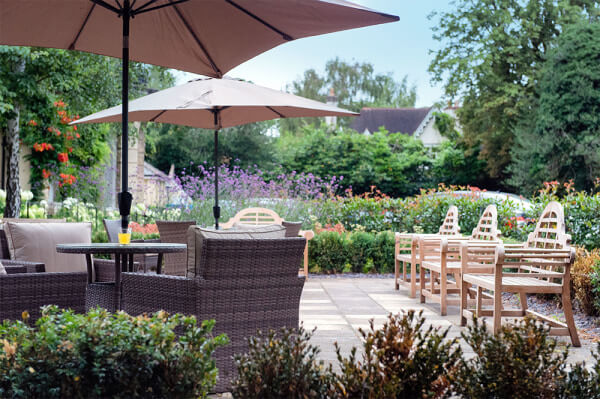
Page contents
There are many benefits to spending time in sensory and dementia-friendly gardens. Gardening is a much loved pastime for many people and is also very therapeutic. When moving to a care home it may be a worry that those gardening gloves will need to be hung up for good, but that needn’t be the case.
Many care homes have sensory and dementia-friendly gardens. These have a range of benefits including reducing stress, easing anxiety and giving residents a sense of purpose.
Sue Faulkner, community and lifestyle manager at The Fremantle Trust, a charity offering care and support services for elderly people and adults with learning disabilities, and organisers of the Fremantle in Bloom gardening competition, says:
“There are so many benefits of gardening in care homes; it promotes independence, socialising and remembering time spent in their own gardens. Not to mention the physical benefits of walking, planting or weeding, along with the fresh air. Everyone benefits in different ways.”
Benefits of dementia-friendly gardening
Whilst spending time in nature is proven to boost everyone’s mental health, helping to reduce stress and improve our mindset, this is especially true for residents living with dementia. The Social Care Institute for Excellence (SCIE) states that if people with dementia spend time outdoors in a dementia-friendly garden, it will help them to ‘relax and feel calm’, whilst also meaning they are ‘less likely to become agitated and distressed’.
Advantages
- Promote socialisation, giving opportunities to spend time with other residents and get involved with life at the home.
- Give the person a chance to take the role of carer, committing time to caring for the plants and other parts of the garden can help to boost self-esteem.
- Increase attention span by having a task to focus on and work through.
- Help with time orientation, promoting a better sense of the day passing and improving sleeping patterns.
- Offer the opportunity to learn new skills or relearn lost skills.
Care homes work hard to make their outside space enjoyable for all residents, but they may take additional steps to benefit those living with dementia, including designing a sensory and dementia-friendly garden.
What is a sensory garden?
Sensory gardens are created to engage with as many of the senses as possible. This is beneficial for every person who will spend time in the garden, but for people with dementia or those with learning disabilities or sensory impairments, a sensory garden can be especially impactful, helping them to draw on their memories whilst offering an inclusive space where they feel relaxed and calm.
Advantages
- Opportunities for reminiscence – for people living with dementia, memories can be recalled from the smallest of action, things like watering the plants or picking fruits could help them to recall memories from tending to their own gardens with their loved ones. Certain plants, their appearance and scent can also provoke happy memories.
- Dedicated areas – for example a designated calm space will be teamed with plants and flowers which have a relaxing smell and calming colours, whereas a communal area may have more colour and vibrancy. A variety of seating areas also give residents a chance to see the garden from different perspectives.
- Different features – of course plants and flowers are key features of any garden, but lots of care home gardens also include things like water features, lights, wind chimes or garden ornaments like gnomes which bring back memories whilst also engaging with different senses.
Care homes try their best to ensure their gardens are safe for residents to spend time in independently as well as with the support of the care team.
If you are looking for a care home for yourself or a loved one and are particularly interested in the outside space, it’s a good idea to visit the setting and check out the garden for yourself. Look at whether there are any steep steps or uneven paths that could have an impact on accessibility.
Find your ideal care home
- Explore a wide range of care options and facilities
- Read independent ratings and reviews
- Connect directly with care homes to book a tour and discuss your needs
Active role in dementia-friendly gardening
A beautiful garden is all the more rewarding when you’ve played a part in helping it come to life. No matter how small a role they play, residents who are involved in the gardening process in some way are much more likely to want to spend time outside and enjoy the benefits of their hard work.
Gardening also has physical advantages
Victoria Hill, co-founder of Growing Support, a therapeutic gardening project based in the South West of England, says: “Gardening gives people the opportunity to use their fine motor skills. These are vital for keeping their independence as fine motor skills are needed for doing up your buttons or feeding yourself.
“It also provides the opportunity to exercise gross motor skills which are important for strength and balance and help prevent falls. Going outdoors is very important for sensory stimulation.”
People with dementia may need extra support
“A lot of people who live in care homes are still physically very strong but people with dementia may need some help remembering how to do some gardening tasks. The volunteers work alongside them to help break down the task into manageable chunks.”
To play a role in maintaining or even improving the outside space, residents could speak to care staff to see how they can get involved with dementia-friendly gardening. Some care homes also offer Gardening Clubs or initiatives to encourage residents to spend time outside and participate in whatever way they can.
Aria Care, which has a number of care homes located across England, Scotland and Jersey, recently launched its ‘Aria in Bloom’ initiative. Residents and staff work together to prepare the care home’s garden for the warmer days ahead.

Interactive care home gardens
Many care home gardens are designed to be interactive, intentionally encouraging residents to spend time within them, regardless of their green fingered capabilities.
A great example of this is Midford Manor, a care home in Bath which has introduced a play garden.
The idea for the garden was created through a collaboration between Hallmark Care Homes Foundation and London Play, a charity which aims to ensure children have the space, time and freedom to play.
Intergenerational care
Designed with the help of local children and inspired by residents’ own childhood play experiences, the garden enables all generations to reap the rewards of spending time in nature.
Carol Britton, general manager of Midford Manor Care Home, says: “The Play Garden is invaluable to our residents and their families. It encourages families to come more often and the visits are more pleasant and enjoyable.”
Stephen Burke, chief executive of Hallmark Foundation, says that the play garden “promotes intergenerational interaction in the care home and encourages a family friendly environment where children love visiting their older relatives. It’s a win-win for all generations. We hope it will encourage other care homes to use their outdoor space creatively.”


